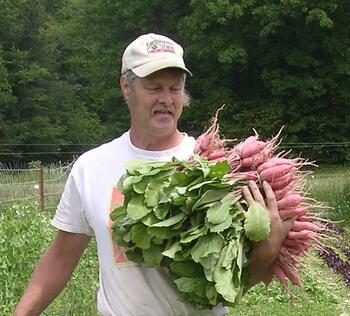january 10 - 12, 2019
2019 keynote

Transitioning Your Farm to the Next Generation (pdf)
In 2012, Alex and Betsy Hitt, owners of Peregrine Farm located outside Chapel Hill, North Carolina, began the process of bringing one of their employees into the business as a partner, allowing them to slowly step back from daily field operations. The Hitts started their farm in 1981, fresh graduates from Utah State University with degrees in soils (Alex) and forestry (Betsy). Both have worked full time on the farm since 1990 and make their entire living off of 2.5 acres.
Peregrine Farms is a diversified operation, with about 75% vegetable production and 15% cut flowers, with the rest in small fruit. The majority of income comes from a two-day-a-week farmers' market, with the rest in direct sales to a number of restaurants. Over the years, products have also been marketed through U-pick, roadside stand, grocery stores, florists and floral wholesalers.
Moving into their seventh decade, Alex and Betsy found the summer production season to be more difficult and wearing than it was in the past. Aches and pains were slower to fade, so they began thinking about the future. As first-generation farmers, the Hitts wanted the farm they built to continue on into the future, but they had no children to pass the farm to. Many farmers have to sell their ground to afford retirement, but they wanted to stay in their home and enjoy their property. So what to do?
According to Alex, “You don’t pass on, close or sell any business quickly, especially one where you live and have nurtured your whole life. It takes time to put all the pieces in place as there is estate planning, financial planning, tax planning and all manner of legal details to work through.”
For the last seven years, Alex and Betsy have worked the farm with their business partner Jennie, who now oversees the field crew and all aspects of production with input from Alex and Betsy. Come and learn more about how Alex and Betsy are navigating transitioning their farm to the next generation with “The Jennie Project”.
In 2012, Alex and Betsy Hitt, owners of Peregrine Farm located outside Chapel Hill, North Carolina, began the process of bringing one of their employees into the business as a partner, allowing them to slowly step back from daily field operations. The Hitts started their farm in 1981, fresh graduates from Utah State University with degrees in soils (Alex) and forestry (Betsy). Both have worked full time on the farm since 1990 and make their entire living off of 2.5 acres.
Peregrine Farms is a diversified operation, with about 75% vegetable production and 15% cut flowers, with the rest in small fruit. The majority of income comes from a two-day-a-week farmers' market, with the rest in direct sales to a number of restaurants. Over the years, products have also been marketed through U-pick, roadside stand, grocery stores, florists and floral wholesalers.
Moving into their seventh decade, Alex and Betsy found the summer production season to be more difficult and wearing than it was in the past. Aches and pains were slower to fade, so they began thinking about the future. As first-generation farmers, the Hitts wanted the farm they built to continue on into the future, but they had no children to pass the farm to. Many farmers have to sell their ground to afford retirement, but they wanted to stay in their home and enjoy their property. So what to do?
According to Alex, “You don’t pass on, close or sell any business quickly, especially one where you live and have nurtured your whole life. It takes time to put all the pieces in place as there is estate planning, financial planning, tax planning and all manner of legal details to work through.”
For the last seven years, Alex and Betsy have worked the farm with their business partner Jennie, who now oversees the field crew and all aspects of production with input from Alex and Betsy. Come and learn more about how Alex and Betsy are navigating transitioning their farm to the next generation with “The Jennie Project”.
2019 Great Plains Growers Conference is
sponsored in part by SARE

